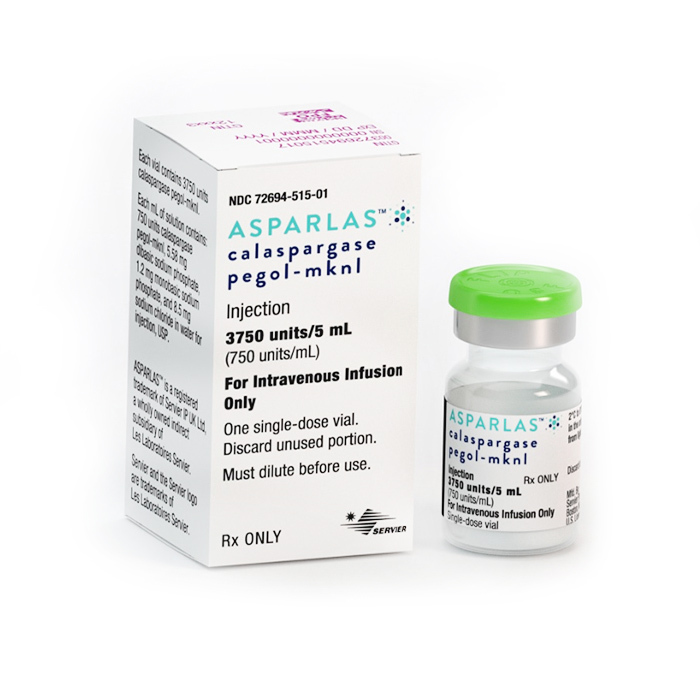Asparlas (calaspargase pegol-mknl) vs Vanflyta (quizartinib)
Asparlas (calaspargase pegol-mknl) vs Vanflyta (quizartinib)
Asparlas (calaspargase pegol-mknl) is a modified enzyme used as part of a multi-agent chemotherapeutic regimen for the treatment of acute lymphoblastic leukemia (ALL) in pediatric and young adult patients. Vanflyta (quizartinib) is a tyrosine kinase inhibitor specifically designed to treat adults with relapsed or refractory acute myeloid leukemia (AML) with a particular genetic mutation known as FLT3-ITD. When deciding between these two medications, it is crucial to consider the specific type of leukemia, the patient's age, and the genetic characteristics of the cancer cells, as Asparlas is tailored for ALL in a younger population, while Vanflyta targets AML with a specific mutation in adults.
Difference between Asparlas and Vanflyta
| Metric | Asparlas (calaspargase pegol-mknl) | Vanflyta (quizartinib) |
|---|---|---|
| Generic name | Calaspargase pegol-mknl | Quizartinib |
| Indications | Acute lymphoblastic leukemia (ALL) | Relapsed or refractory acute myeloid leukemia (AML) with FLT3-ITD mutation |
| Mechanism of action | Asparagine specific enzyme | Tyrosine kinase inhibitor |
| Brand names | Asparlas | Vanflyta |
| Administrative route | Intravenous | Oral |
| Side effects | Allergic reactions, pancreatitis, thrombosis, liver dysfunction, hemorrhage | QT prolongation, nausea, thrombocytopenia, musculoskeletal pain, anemia |
| Contraindications | History of serious hypersensitivity to pegylated asparaginase products | Long QT syndrome, hypokalemia, hypomagnesemia |
| Drug class | Antineoplastic agent | Antineoplastic agent, kinase inhibitor |
| Manufacturer | Servier Pharmaceuticals | Daiichi Sankyo |
Efficacy
Asparlas (calaspargase pegol-mknl) Efficacy in Leukemia
Asparlas, known by its generic name calaspargase pegol-mknl, is a chemotherapeutic agent specifically indicated for the treatment of acute lymphoblastic leukemia (ALL) in pediatric and young adult patients. It is a form of asparaginase, an enzyme that depletes the amino acid asparagine, which leukemia cells require for survival and proliferation. The efficacy of Asparlas in treating ALL was demonstrated in clinical trials where it was used as a component of a multi-agent chemotherapeutic regimen. Patients treated with Asparlas showed a maintained asparaginase activity level, which is associated with a higher remission rate in ALL. Furthermore, the drug's pegylation allows for an extended circulation time in the body, reducing the frequency of dosing compared to other forms of asparaginase.
Vanflyta (quizartinib) Efficacy in Leukemia
Vanflyta, with the generic name quizartinib, is an oral tyrosine kinase inhibitor that targets FLT3 (FMS-like tyrosine kinase 3), a receptor that is often mutated in acute myeloid leukemia (AML). FLT3 mutations are associated with a poor prognosis in AML, and the inhibition of this receptor can lead to decreased leukemia cell growth. The efficacy of Vanflyta was evaluated in clinical trials involving patients with relapsed or refractory AML with FLT3 mutations. In these trials, Vanflyta demonstrated an improvement in overall survival and rates of complete remission with full or partial hematologic recovery compared to chemotherapy. The results indicate that Vanflyta can be an effective treatment option for AML patients with FLT3-ITD mutations, which are a subset of FLT3 mutations.
Comparative Efficacy in Leukemia Treatment
While both Asparlas and Vanflyta are used in the treatment of different types of leukemia, their mechanisms of action and targeted patient populations differ. Asparlas is effective in the pediatric and young adult population with ALL by depleting asparagine levels necessary for leukemia cell survival. In contrast, Vanflyta is used in adult patients with AML and targets the FLT3 mutation, which is a driver of disease progression in this type of leukemia. Both medications have shown efficacy in their respective indications and represent advancements in the targeted treatment of leukemia.
Conclusion on Efficacy in Leukemia
In conclusion, Asparlas and Vanflyta have shown significant efficacy in the treatment of leukemia, albeit in different subtypes and patient populations. Asparlas has been effective in inducing and maintaining remission in pediatric and young adult patients with ALL, while Vanflyta has improved survival outcomes in adult patients with relapsed or refractory AML harboring FLT3 mutations. The use of these targeted therapies is a testament to the progress in personalized medicine, offering hope for improved outcomes in patients with these challenging forms of leukemia.
Regulatory Agency Approvals
Asparlas
-
Food and Drug Administration (FDA), USA

Vanflyta
-
European Medical Agency (EMA), European Union

-
Food and Drug Administration (FDA), USA

Access Asparlas or Vanflyta today
If Asparlas or Vanflyta are not approved or available in your country (e.g. due to supply issues), you can access them via Everyone.org.
How it works

Make an enquiry
Choose the medicine you want to buy, answer a couple of questions, and upload your prescription to speed things up. We’ll get back to you within 24 hours.


Make an enquiry
Choose the medicine you want to buy, answer a couple of questions, and upload your prescription to speed things up. We’ll get back to you within 24 hours.


Breeze through the paperwork
We'll guide you through the required documents for importing unapproved medicine, ensuring you have all the necessary information.


Get a personalized quote
We’ll prepare a quote for you, including medicine costs and any shipping, administrative, or import fees that may apply.


Receive your medicine
Accept the quote and we’ll handle the rest - sourcing and safely delivering your medicine.

Some text on this page has been automatically generated. Speak to your physician before you start a new treatment or medication.
Let's talk
If you have any questions, call us or send us a message through WhatsApp or email:
Contact us




